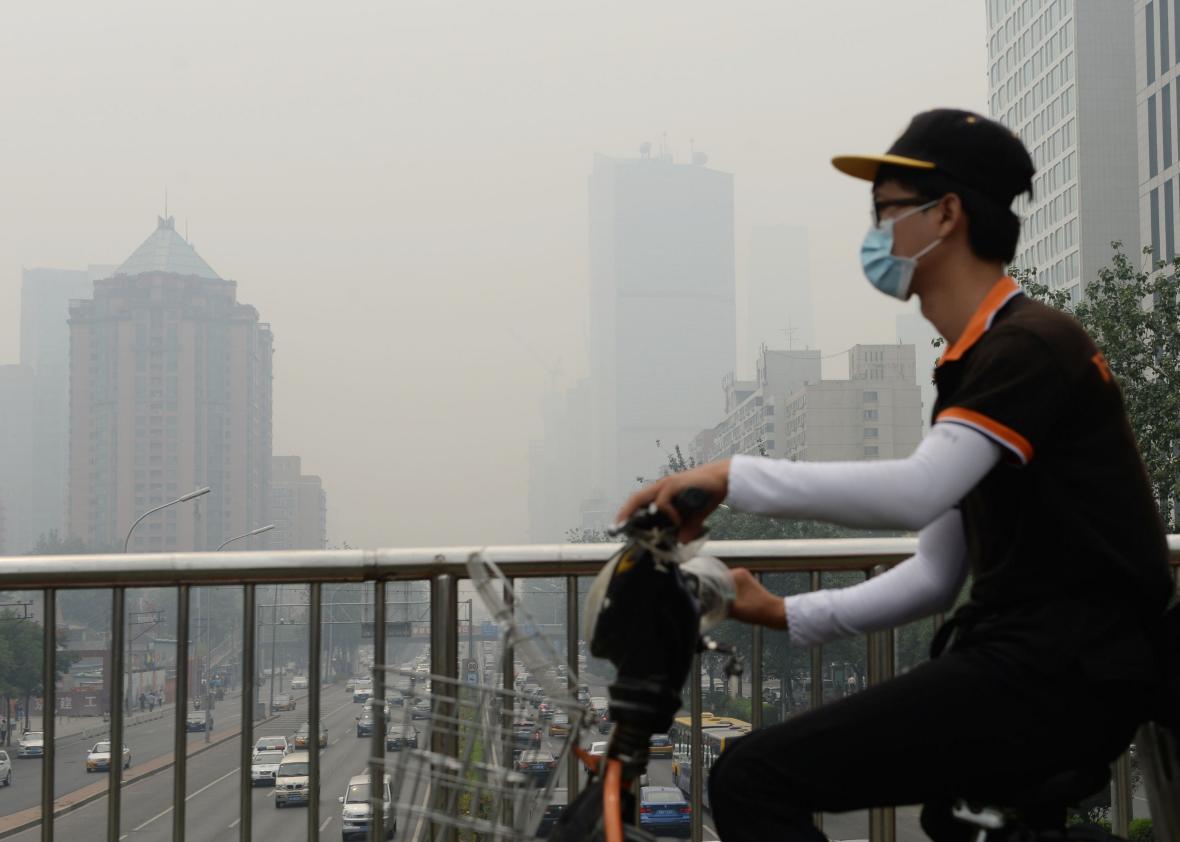If there’s a silver lining to the smoggy gray cloud hanging over the Chinese economy this week, it’s that the country’s slowing economic activity could be good for the environment. China has been focused on reducing emissions: Under a landmark agreement signed with the United States last November, it pledged to peak its emissions by 2030. And under the commitment it has put forward ahead of the U.N. climate talks in Paris in December, it has pledged to increase the share of non–fossil fuels in its energy mix to 20 percent by the same year and reduce its carbon intensity—the amount of CO2 emitted per unit of GDP—by 60 percent to 65 percent below 2005 levels. But economic conditions may play as much of a role in its emissions reduction over the next few years as government policy.
As the Wall Street Journal reported last month, the “war on pollution” declared by Xi Jinping’s government in response to public outrage over notoriously polluted air, water, and soil has been aided by the bleak state of the country’s heavy industries. Particulate levels in Beijing are finally falling, and the capital has been blessed with unusual stretches of blue-sky days, in part thanks to the government’s crackdown on coal-fired power plants, but also because factories all around Beijing are shutting down.
China’s coal use—alone one of the major drivers of climate change—fell for the first time in a century last year, and environmentalists have begun to tentatively hope that it has permanently peaked years ahead of schedule. Government environmental policies may have played some role in that, but so has an overall slowdown in heavy industry that has also impacted imports of rubber, iron ore, and other materials. According to the International Energy Agency, the slowdown in the Chinese economy, and the corresponding reduction in coal use, is the main reason why global emissions remained flat in 2014 despite the global economy growing by 3 percent.
Of course, a slumping Chinese economy is not a long-term solution for climate change. U.S. emissions fell between 2007 and 2012, largely as a result of our recession, but increased again in 2013 as the economy recovered. (There are, however, promising indications that emissions are no longer growing at the same speed as the economy.) Amid the downturn, China needs to continue to phase out coal and promote cleaner forms of energy. Xi’s economic plans call for a shift of emphasis from heavy industries toward technology and services, which would help reduce emissions, but there’s a risk that, spooked by the markets and fears of social instability, China could go back to investing heavily in carbon-intensive manufacturing and infrastructure projects to create jobs. It also won’t help the planet if China’s carbon-intensive manufacturing sector simply moves to less developed countries in Southeast Asia. But an overall slowdown in emissions could buy China some time to put in place the policies needed to accomplish its emissions goals. (Required caveat: Scientist say countries’ current CO2 pledges still aren’t enough to prevent catastrophic climate change.)
In one promising sign, even amid this week’s turmoil, Chinese legislators are considering an air pollution law that would give the central government more power to punish negligent companies and local authorities and impose new caps on coal consumption.
If the downturn might be, on balance, good news for the world’s climate, it’s bad news for the countries whose economies are tied in large part to fueling China’s explosive growth. Though it recovered somewhat Tuesday amid an overall market rebound, the already collapsing price of oil hit six-year lows on Monday and coal futures hit 12-year-lows last week amid fears that the country’s insatiable appetite for energy is coming to an end. As the New York Times reports Tuesday, the low price of oil, driven by falling Chinese demand as well as stubbornly high production from the U.S. and Saudi Arabia, is driving political instability in countries including Russia, Venezuela, and Iraq.
Also worth considering is Australia, whose prime minister, Tony Abbott, has stubbornly continued to insist that coal exports will be the foundation of his country’s prosperity for years to come, approving a host of new mining projects even amid growing international condemnation of his environmental policies. That strategy depends on China and India continuing to buy Australian coal. With China’s coal imports falling 34 percent in the first seven months of this year, and India looking to reduce its dependence on foreign imports, that’s not looking like such a sure bet.
